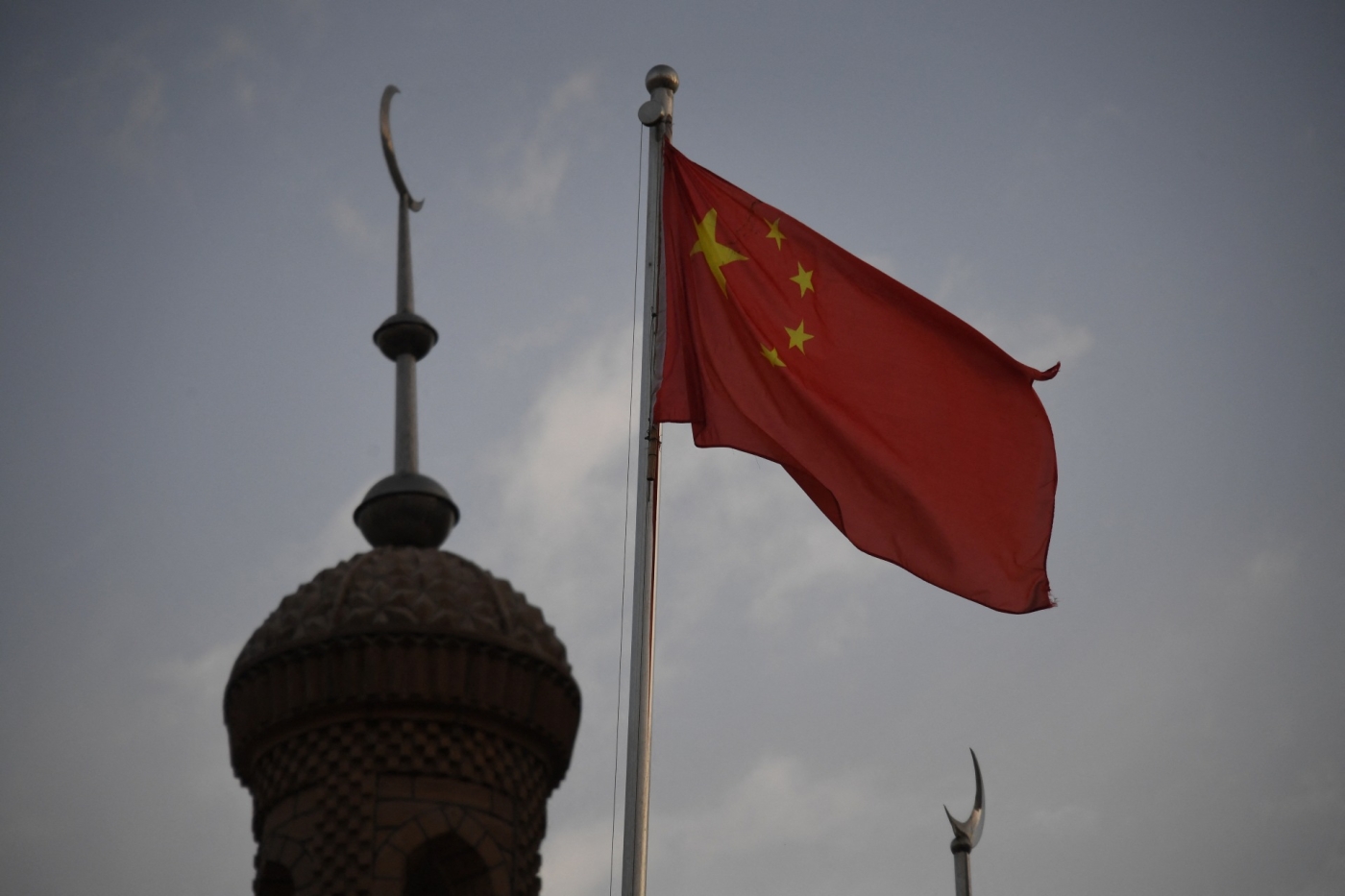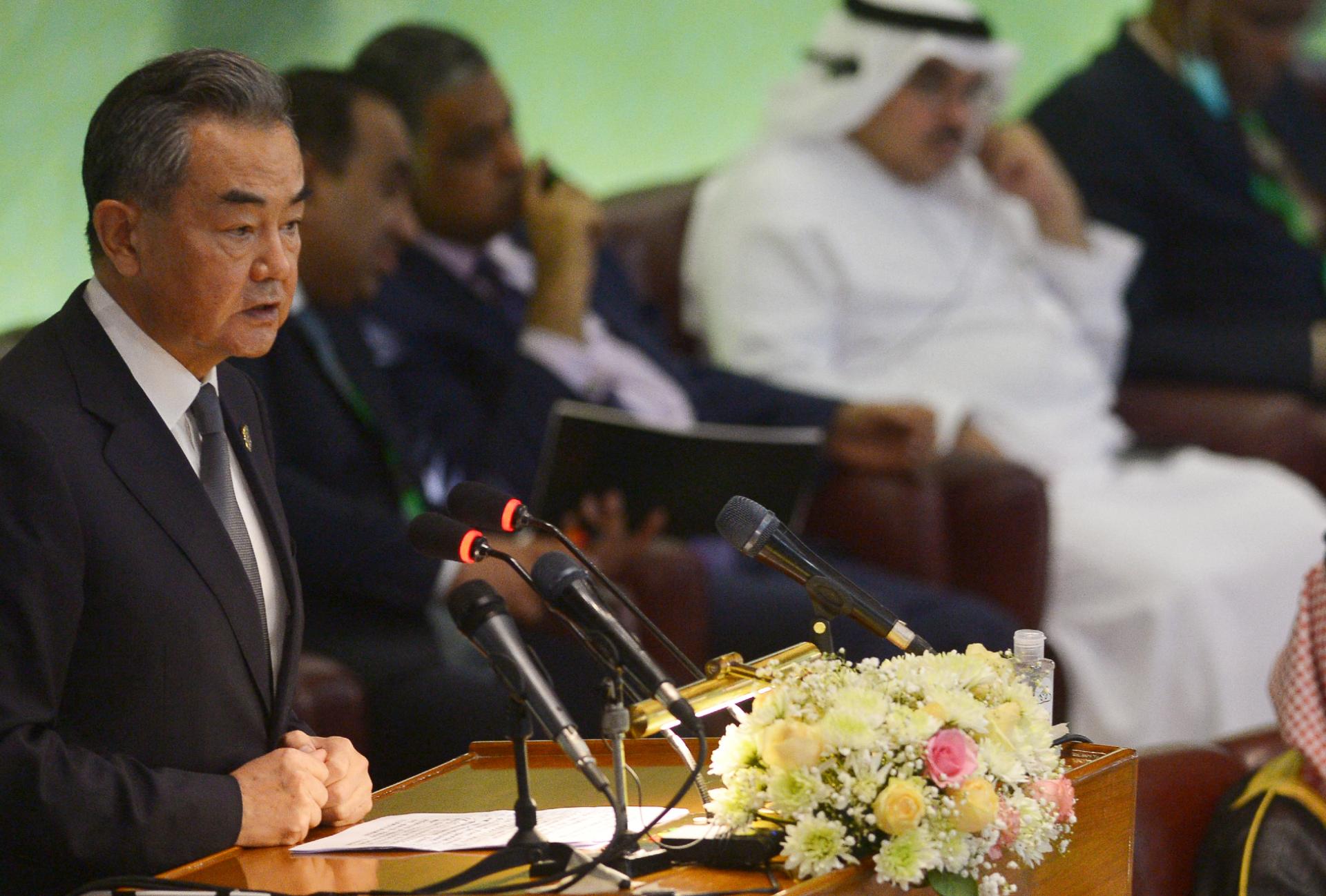Muslim nations tilt towards China as US influence fades and Uyghurs ignored
Chinese foreign minister's presence at OIC conference in Pakistan shows Muslim world is now looking east despite Uyghur abuses, analysts say

The attendance of Chinese Foreign Minister Wang Yi at last week’s Organisation of Islamic Cooperation (OIC) meeting in Pakistan is a clear signal that many countries in the Muslim world are moving away from their traditional alliances with the US, analysts have told Middle East Eye.
The conference of OIC foreign ministers in Islamabad concluded with a familiar resolution, condemning the oppression of Muslims in Palestine and Indian-administered Kashmir and rising Islamophobia in western countries.
But the statement made no mention of China’s persecuted Uyghur minority, drawing condemnation from Uyghur activists already irked by the organisation’s invitation to Wang to address the conference as a special guest.
It is not unusual for hosts of OIC conferences to invite leaders from the non-Muslim world for their own strategic reasons. In 2019, the United Arab Emirates invited then-Indian Foreign Minister Sushma Swaraj as it lobbied for greater Indian investment.
Pakistan's invitation to China came with Pakistani Prime Minister Imran Khan seeking to use the OIC conference to bolster his own position ahead of a parliamentary vote of no confidence on his leadership next week by courting the support of his country's powerful neighbour.
Diplomatic relations between Islamabad and Washington have soured under Khan's leadership. Khan has not spoken to US President Joe Biden since his inauguration last year, and the US was widely reported in Pakistani media this week to be behind an alleged conspiracy - dismissed as "baseless" by the US State Department - to topple Khan.
No wonder then, analysts said, Khan has moved towards China instead.
“China has hundreds of billions of dollars of investments in Pakistan," Haroon Aslam, a retired senior military general and political analyst, told Middle East Eye.
"That makes them a serious stakeholder in the country. Political stability means economic stability, and when it comes to Imran Khan, he definitely sees a better future for his country when aligned with Russia and China."
Moving away from the West
But Wang’s invitation to Pakistan reflected a unanimity of interest among most leading OIC member states, analysts said.
“Geopolitically and economically, the Muslim bloc is fast moving away from the West,” Umer Karim, a visiting fellow at the Royal United Services Institute think tank in London, told MEE.“More recently the pressure from the broader West to support Ukraine hasn't gone down well. But there is real history between many of the Muslim countries and the West, and much of its all is too recent to forget.”
Karim said the withdrawal last year of US missile defence systems from Saudi Arabia, which has been targeted with missiles and drones by Houthi militants in Yemen, had led some OIC countries to review their own security situations.
“Pulling out Patriot missile defence batteries from Saudi Arabia last year, a leading OIC member will naturally see other members lose trust in the US's security guarantees,” said Karim.
Reports last week said the US had transferred an unspecified number of Patriot systems back to Saudi Arabia in what was widely interpreted as a move to ease tensions with its long-time Gulf ally.
“[OIC members] can see that China is a rising power that will eventually be able to challenge western hegemony across not only economic, but also political and possibly military domains'
- Tallha Abdulrazaq, University of Exeter
Tallha Abdulrazaq, an academic at the University of Exeter, says the OIC’s tilt towards China can be seen as pragmatism on the part of its member states.
“The reason behind the shift is to face up to new geopolitical realities. OIC member states are largely (with notable exceptions) still within the West's orbit, but they aren't blind,” he told MEE.
“They can see that China is a rising power that will eventually be able to challenge western hegemony across not only economic, but also political and possibly military domains.”
The US may also be paying a price for its legacy of interventions in the region, said Abdulrazaq.
“Generally, the US doesn't enjoy a good reputation in the Middle East and that is largely due to its legacy of wars and occupation, especially the wars against Iraq in 1991 and 2003 and the disastrous aftermath of the occupation there.”
Karim cited conversations with several Middle Eastern officials and leaders in which they had pointed to the hypocrisy of Western nations.
“The wars in Iraq, Afghanistan, proxies in Syria, bombings in Libya, Kashmir and the regular bombardment of Palestine, besides the unrelenting support, both financial and militaristic, for Israel, has deeply dented the credibility of the US and European countries,” he said.
'Ancient civilisations'
China is well aware of rising anti-West sentiment across the Muslim world and Wang chose his words carefully in Islamabad, appealing to shared history, mutual political leanings and the prospect of economic partnerships with the Muslim world.
“Both Chinese and Islamic civilisations are ancient civilisations with important influence in the world,” he said.
“China will continue to support Islamic countries in drawing on Islamic wisdom to solve current hotspot issues such as those related to Palestine, Afghanistan and Ukraine, and firmly holding the key to maintaining stability and promoting peace in their own hands.”
In the buildup to the conference, China also co-sponsored an OIC-backed resolution proposed by Pakistan at the United Nations General Assembley to create an international day to combat Islamophobia.
Karim said distrust towards the West is allowing China more space to manoeuvre in the Muslim world.
“The US moved out of the Middle East to focus on China, but with the Russia-Ukraine conflict serving as a distraction, China is fast strengthening its strategic base and making new friends,” he said.
“This OIC conference has allowed China a platform to reach out to the broader Muslim bloc and push itself as the OIC's leading economic partner. That’s why many Muslim states are changing their foreign and security policy outlook to be more in line with that of China.”
For China, closer engagement with the Muslim world also presents further economic opportunities and privileged access to a 1.5 billion-strong market.
According to the International Monetary Fund’s Direction of Trade Statistics, over the last 20 years, China has overtaken the US in becoming the leading trade partner with the entire Muslim world.
“China has a lot to offer to the Muslims, especially in terms of trade, energy exports for fossil fuel-rich Muslim countries, trade routes, access to its Belt and Road initiative, and as a way of diversifying away from US hegemony, especially at a moment in history where Washington seems to care less and less for its more traditional 'allies' in the Muslim world,” said Abdulrazaq.
“By moving closer to China, it could trigger a reaction and force the US to engage more as a point of competition between great powers. If Muslim countries are canny, they will balance both powers off each other to better serve their interests.”
With Pakistan alone, China has diverse partnerships ranging from the energy sector to defence industries, infrastructure development, and the Belt and Road Initiative (BRI), a proposed series of interconnected trade routes running west which include a road link between the Uyghur-majority province Xinjiang and Gwadar, a port city on the Arabian Sea.
'As relations have deteriorated with the West, Pakistan's dependence on Chinese military equipment has reached unprecedented levels'
- Umer Karim, RUSI
“BRI serves China's strategic interests, in case certain powers in the world decide to block China's shipping routes in the South China Sea. BRI is the fallback option; this puts Pakistan in a crucial position,” said Karim.
Muslim countries which have either endorsed the BRI or committed in some form to partnering with it include Egypt, Iran, Iraq, Qatar, Saudi Arabia, Turkey, and the United Arab Emirates.
Pakistan also has comprehensive defence partnerships with China, said Karim, including deals for fighter jets, naval frigates and tanks.
“As relations have deteriorated with the West, Pakistan's dependence on Chinese military equipment has reached unprecedented levels. All branches of Pakistan's Armed Forces remain fully reliant on China in their pursuit to maintain credible deterrence against India.”
Arms and oil
With Iran, in direct contravention of current US sanctions, China is set to invest nearly $400bn in the country's energy, banking, telecom, shipping and railways sectors.
Beijing is already the largest buyer of oil from Gulf nations – and they too have returned the favour.
Abu Dhabi's sovereign wealth fund signed a lucrative deal with China's artificial intelligence firm, SenseTime, which develops facial recognition software, to base its regional research and development headquarters in the emirate.
Pushing back on pressure from the US, Saudi Arabia, the UAE, and Kuwait have contracted Chinese telecom giant Huawei to build their 5G telecoms infrastructures.
In terms of cultural and linguistic alignment, countries like Pakistan and Saudi Arabia now teach Chinese as a third language in public and private schools.
However, Abdulrazaq said, closer economic links with China were being forged even as China’s oppression of the Uyghurs was mostly being ignored by Muslim leaders.
Abdulrazaq said this position was “indefensible but understandable”.
“Some Muslim countries like Pakistan are in a very difficult position regarding this issue and they are powerless to do much about it due to their circumstances and economic weakness. But other countries such as the UAE have no excuse.
“While relations with China would of course be welcome to such wealthy states, they don't immediately need them, yet they choose to throw the Uyghurs under the bus for political reasons.”
https://www.middleeasteye.net/news/china-muslim-countries-tilt-uyghur-abuses-ignored-us-influence-fades






0 Comments:
Post a Comment
Subscribe to Post Comments [Atom]
<< Home